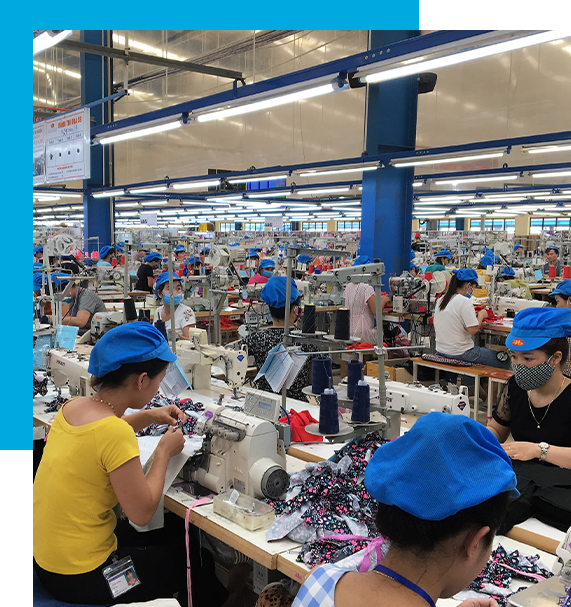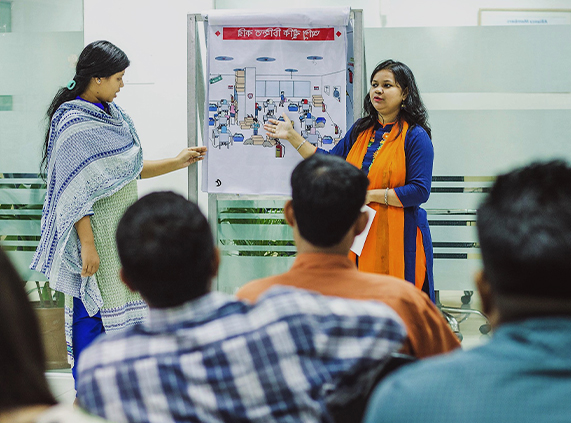Each day at our headquarters, stores, offices, and distribution centers around the world, our approximately 22,000 employees (as of the end of fiscal 2019) strive to meet our vision of serving the needs of all families with young children.
Without the passion and commitment of our diverse work family around the world, we would be unable to deliver on this commitment-or to contribute our talents and resources to nurture the health and wellbeing of children and families in our local communities. We seek to provide our employees with an inclusive and fulfilling work environment and to ensure that workers across our supply chain are treated with fairness, dignity, and respect.
Protecting Human
Rights Across Our
Supply Chain
We believe all workers and communities deserve to be treated fairly and with dignity. Just as we strive to be a responsible, responsive employer and corporate citizen, we expect the same from our suppliers in their treatment of the workers around the world who make our products possible. We help to ensure this standard by carefully selecting the companies we chose to work with and upholding rigorous ethical expectations through extensive training and monitoring as part of long-term collaborations.
Carter’s has no tolerance of forced labor. Our products are not manufactured in Xinjiang and we have taken steps to ensure that our products do not include materials produced by entities that may use forced labor. For instance, our due diligence process includes inspections of our suppliers’ factories. We provide clear rules of the road as to forced labor in our supply chain, including requiring that suppliers conduct due diligence throughout the recruitment and hiring process to prevent and address labor exploitation by third parties, such as labor brokers or contractors. We also clearly specify in our commercial relationships our expectations as to no forced labor and take other steps, including expanding our traceability efforts, in support of our requirements that forced labor not be present in our supply chain.

Making Our Standards Clear
Our Vendor Code of Ethics and our Social Responsibility Policy outline our standards for supplier behavior in creating a fair and safe workplace.
Our Social Responsibility Policy establishes our expectations for our global suppliers and guides our oversight. It is derived from the policies, standards, and conventions of the International Labor Organization (ILO), and includes a commitment to the Universal Declaration of Human Rights. While we recognize and respect all the cultural and legal environments in which our suppliers operate, our policy sets forth social responsibility requirements that suppliers must satisfy in order to do business with us.
Additionally, we comply with the California Transparency in Supply Chains Act, which requires companies doing business in California to disclose their efforts to ensure slavery and human trafficking are not part of their supply chains.

Carter’s does not tolerate worker abuse or endangerment. At a minimum, all of our suppliers must comply with these practices:
- The use of child labor or forced labor is strictly prohibited. Suppliers must conduct due diligence throughout the recruitment and hiring process to prevent and address labor exploitation by third parties, such as labor brokers or contractors.
- Suppliers must never discriminate based on any personal characteristic or belief, such as race, gender, age, nationality, religion, social or ethnic origin, sexual orientation, pregnancy, family status, or political opinion. Suppliers shall provide all employees with equal pay for work of equal value regardless of race, ethnicity, gender, or social class or status.
- All suppliers must agree that no worker pays a portion of their wage to retain their job, workers retain control of their travel documents and have full freedom of movement, and all employees are informed of the basic terms of their employment before leaving home.
- The use of physical or mental disciplinary practices, such as intimidation, psychological coercion, threats, or harassment of any kind, is strictly prohibited. Suppliers must treat workers in a fair manner and with dignity and respect.
- Suppliers must compensate workers in a timely manner, with wages and benefits that comply with all local and national laws.
- Suppliers must establish work schedules that are consistent with local legal requirements, including maximum work hour limits.
- Suppliers must recognize and respect the rights of workers to participate in a collective bargaining unit.
- All work must be conducted in legitimate work facilities.
- Suppliers must provide workers with safe, clean, and healthy working conditions, by ensuring equipment safety, properly ventilated and lit work areas, appropriate personal protective equipment, working fire alarms, and an emergency evacuation plan.
Partnering for Lasting Compliance
Our Social Compliance Program is designed to ensure our suppliers operate according to the requirements of our Social Responsibility Policy. The program requires suppliers to comply with the applicable labor and environmental laws and regulations of the country in which merchandise is produced. The program also encourages suppliers to achieve practices that go beyond minimum standards.
Factory audits are a central pillar of our monitoring program. We regularly audit our suppliers to verify compliance with our policies, as well as to strengthen working conditions and labor practices in factories. We contract with accredited and internationally recognized third party auditors to perform these audits. Since 2017, we have also surveyed workers in our supply chain to better understand worker sentiment and treatment.
If an audit finds non-compliant practices, or the score is below passing, the supplier must work with Carter’s to develop a corrective action plan to remediate all areas of non-compliance. We prefer to work with suppliers to address concerns and enforce our policies, rather than terminate the relationship, as termination is unlikely to correct the underlying issue and may cause further hardship for those who depend upon the facility for employment. However, if a supplier fails to demonstrate improvement, or meet our requirements, we reserve the right to cease working with them.

To help ensure progress in working conditions, however, monitoring alone is not enough. We have also developed a supplier training program that outlines our expectations and provides specific guidance on how to best address concerns related to compensation and benefits, employee documentation, and worker health and safety. The program is updated annually and provided to all of our suppliers from whom we directly source product. In 2018, we strengthened the program by adding dedicated support staff to oversee execution. In the future, we plan to also place individuals on the ground in our leading sourcing destinations to better support our suppliers and enhance workplace conditions.
| Our Supplier Compliance – Direct Suppliers | 2017 | 2018 |
|---|---|---|
| Number of Active Vendors | 65 | 71 |
| Number of Active Factories | 183 | 170 |
| Number of Factories With a Passing Score | 175 | 161 |
| Number of Factories With a Below Passing Score | 8 | 9 |
| Number of Unannounced Audits Conducted | 24 | 41 |
Note: we doubled the number of unannounced audits in 2018.
Seeking Collaborative Solutions
While we strive to improve the workplace conditions of suppliers we source from, we recognize that many challenges are complex or systemic and cannot be solved by any one company alone. In many cases, we believe multi-stakeholder dialogue and collaboration represent the most productive and effective approach to address industry-wide issues. Accordingly, we participate in collective initiatives and organizations, including:

The Alliance for Bangladesh Worker Safety
We were a founding member of this initiative focused on improving worker safety in the ready-made garment industry in Bangladesh by upgrading factories, educating workers and management, empowering workers, and building institutions that can enforce safe working conditions. This initiative ceased operations at the end of 2018.
American Apparel & Footwear Association (AAFA)
As a member of the AAFA’s Social Responsibility Committee, we learn and share information and best practices with industry peers. We are a founding member of this locally managed organization tasked with overseeing the ongoing safety, training and helpline efforts of factories in Bangladesh.
Additionally, we signed the AAFA’s Commitment to Responsible Recruitment to further support industry-wide efforts to assure the fair treatment of foreign workers in our supply chain. The Commitment prioritizes collaboration to eliminate conditions that can lead to forced labor in the countries from which we source products.

